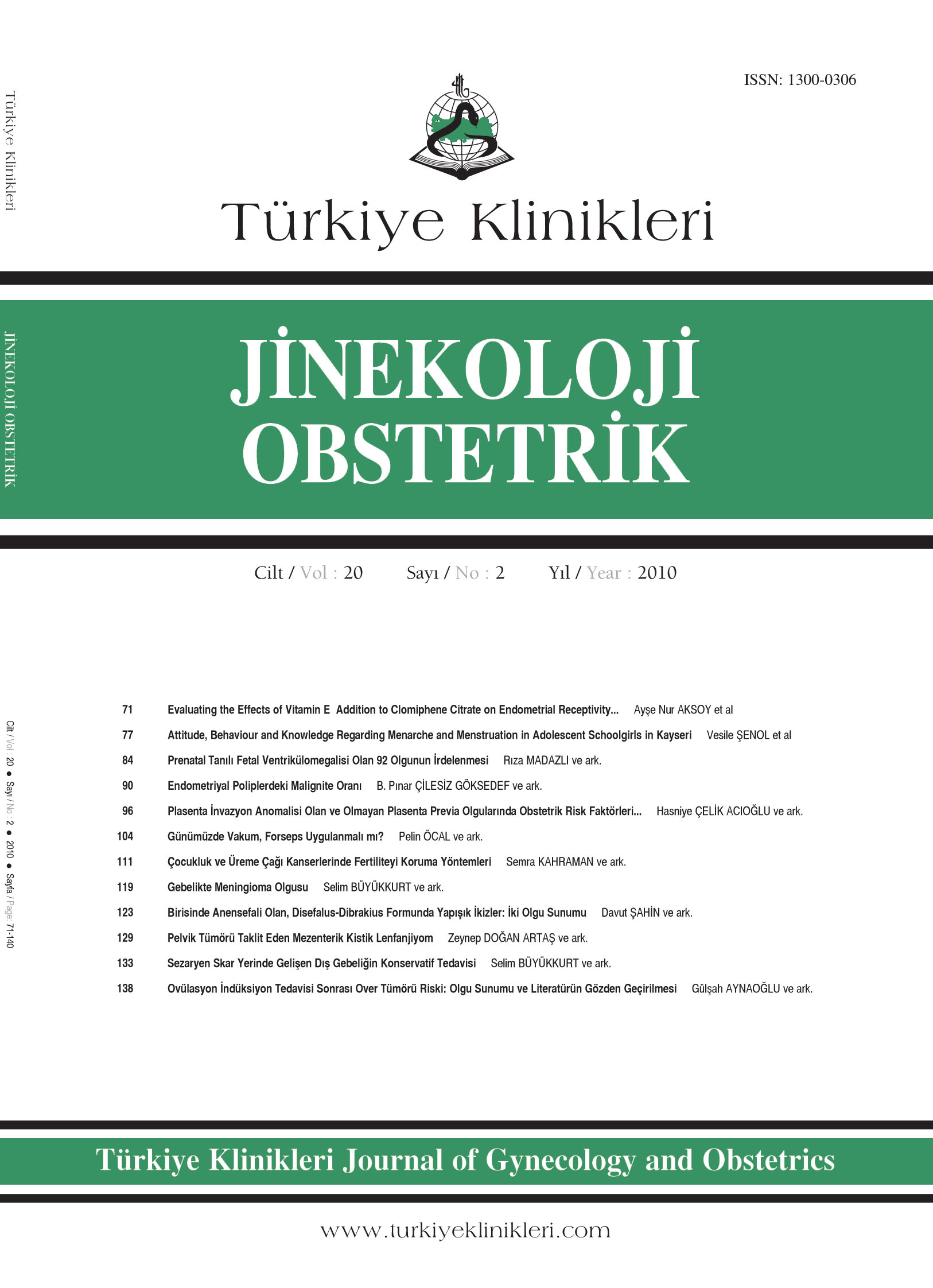Open Access
Peer Reviewed
CASE REPORTS
3389 Viewed1111 Downloaded
A Case of Meningioma in Pregnancy
Gebelikte Meningioma Olgusu
Turkiye Klinikleri J Gynecol Obst. 2010;20(2):119-22
Article Language: TR
Copyright Ⓒ 2025 by Türkiye Klinikleri. This is an open access article under the CC BY-NC-ND license (http://creativecommons.org/licenses/by-nc-nd/4.0/)
ÖZET
Gebelikte kafa içi tümörler nadir görülen sorunlar olsalar da, bu tümörler özellikle gebeliğin son dönemlerinde semptomatik olmaya eğilimlidirler. Tümörün bu dönemden sonra semptom vermesi içerdiği östrojen ve progesteron reseptörleri kadar, damarlanmasının ve içerdiği su miktarının artmasına da bağlıdır. Tümörün göstereceği bulgular yerleşimi ve büyüme hızıyla ilgilidir. Bu makalede, gebeliğin 30. haftasından sonra görme kaybına neden olan bir meningioma olgusunun yönetimi sunulmaktadır. Fetusun olgunlaşması için gerekli olan zamanın gebedeki durumu daha da ağırlaştırma olasılığı karar vericileri zorlayıcı bir sorundur. Bu tür hastaların yönetiminde fetusun olgunlaşmasıyla tümörün yaratabileceği hasarların birlikte değerlendirilebilmesi için doğum hekimi, nöroradyolog, beyin cerrahisi uzmanı, nöro-anesteziyolojist ve yenidoğan uzmanının da aralarında bulunacağı bir takım birlikte çalışmalıdır.
Gebelikte kafa içi tümörler nadir görülen sorunlar olsalar da, bu tümörler özellikle gebeliğin son dönemlerinde semptomatik olmaya eğilimlidirler. Tümörün bu dönemden sonra semptom vermesi içerdiği östrojen ve progesteron reseptörleri kadar, damarlanmasının ve içerdiği su miktarının artmasına da bağlıdır. Tümörün göstereceği bulgular yerleşimi ve büyüme hızıyla ilgilidir. Bu makalede, gebeliğin 30. haftasından sonra görme kaybına neden olan bir meningioma olgusunun yönetimi sunulmaktadır. Fetusun olgunlaşması için gerekli olan zamanın gebedeki durumu daha da ağırlaştırma olasılığı karar vericileri zorlayıcı bir sorundur. Bu tür hastaların yönetiminde fetusun olgunlaşmasıyla tümörün yaratabileceği hasarların birlikte değerlendirilebilmesi için doğum hekimi, nöroradyolog, beyin cerrahisi uzmanı, nöro-anesteziyolojist ve yenidoğan uzmanının da aralarında bulunacağı bir takım birlikte çalışmalıdır.
ANAHTAR KELİMELER: Gebelik, meningioma, beyin tümörü
ABSTRACT
Although intra cranial tumors are a rare complication during the pregnancy, these tumors tend to be symptomatic near to term. At the end of the pregnancy tumor becomes symptomatic because of their estrogenic and pregestational receptor content as well as the increased vascularization and the fluid amount of the mass. Its symptoms are linked to the localization and growth rate. In this paper it is presented the management of a case of meningioma causing visual disturbance after the 30th week of gestation. The possibility of the deterioration of the maternal condition while waiting the fetal maturation is a pressing problem over the decision makers. For the appropriate evaluation of the fetal maturation and possible hazards of the tumor, the management of these patients should be done by a team composed from an obstetrician, neuro-radiologist, neurosurgeon, neuro-anesthesiologist and neonatologist.
Although intra cranial tumors are a rare complication during the pregnancy, these tumors tend to be symptomatic near to term. At the end of the pregnancy tumor becomes symptomatic because of their estrogenic and pregestational receptor content as well as the increased vascularization and the fluid amount of the mass. Its symptoms are linked to the localization and growth rate. In this paper it is presented the management of a case of meningioma causing visual disturbance after the 30th week of gestation. The possibility of the deterioration of the maternal condition while waiting the fetal maturation is a pressing problem over the decision makers. For the appropriate evaluation of the fetal maturation and possible hazards of the tumor, the management of these patients should be done by a team composed from an obstetrician, neuro-radiologist, neurosurgeon, neuro-anesthesiologist and neonatologist.
MENU
POPULAR ARTICLES
MOST DOWNLOADED ARTICLES





This journal is licensed under a Creative Commons Attribution-NonCommercial-NoDerivatives 4.0 International License.










